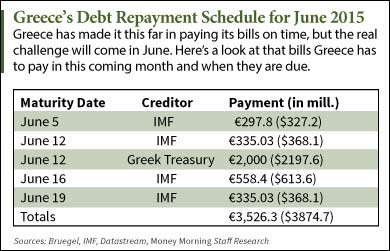Financial news today is abuzz with headlines about the Greek debt crisis.
The biggest development came last night (Thursday) with International Monetary Fund Managing Director Christine Lagarde quoted as saying a Greek exit is a "possibility," adding the IMF to the chorus of Greek creditors who have been raising the stakes on a possible "Grexit."
 It blew up headlines in the financial news today. She since denied having said it.
It blew up headlines in the financial news today. She since denied having said it.
But even if she had, it wouldn't be that scandalous. What makes it so tantalizing is the fact that it would be coming from so high up in the chain of international financial officials trying to clean up the Greek mess.
The conversation on Greece has changed dramatically over the last five years.
In 2010 when former IMF chief Dominique Strauss-Kahn was helping negotiate the initial Greek bailouts, the question wasn't whether Greece would be unable to pay the bailout loans, but whether the moral hazard implications of bailing out a profligate spender would be worth forking over the €110 billion ($120.8 billion).
It essentially became akin to the Troubled Asset Relief Program (TARP) debate in the United States.
In 2012 Greek elections, when the Syriza party first crashed onto the scene as the anti-status quo, leftist force looking to reject internationally imposed austerity measures attached to bailout loans, they were seen as a fringe group.
Then, when the financial news headlines talked about a Grexit, it wasn't about Greece being unable to pay its debts. Rather, it was about whether Greece would actually listen to the Syriza party, reject the bailout package, and default - all as the European Union and IMF held out this lifeline.
A lot has changed since then...
What Eurozone Financial News Today Is Missing
The Greek public voted for that fringe leftist group in January 2015, unlike in the summer of 2012.
The Greek public isn't as receptive to bailout packages with austerity conditionality, but has become a lot more receptive to the Syriza party's message that austerity has been impoverishing the Greek people.
The EU and the IMF are no longer willingly throwing Greece a lifeline. German Chancellor Angela Merkel earlier this year appeared more open to a Grexit than she did in 2012.
And now, even the IMF chief is - allegedly - floating the possibility, despite that very organization helping underwrite those toxic bailout loans in the first place.
A Greek default won't come because Greece decided it didn't want to pay its debts. It will come because the strategy of loading Greece down with more debt to pay off its existing debt was unsustainable in the first place.
Michael Hudson, economist and research professor at the University of Missouri-Kansas City, articulated it best when he said, "debts that can't be repaid, won't." It rings truer here more than ever.
"One way or another, there will be defaults - unless debts are paid in an illusory fashion, simply by adding the interest charges onto the debt balance until the sums finally grow to so fictitious a magnitude that the illusion of viability has to be dropped," Hudson wrote in a 2012 paper.
Greece is at the point where the debt has grown "to so fictitious a magnitude..."
This back-and-forth between Greece and its creditors to unlock another €7.2 billion ($7.9 billion) in bailout loans - to be disbursed once Greece takes the necessary measures to rein in its public debts - is a sideshow.
[epom key="ddec3ef33420ef7c9964a4695c349764" redirect="" sourceid="" imported="false"]
Interestingly enough, a lot of speculators picked up on this back in 2010 when the bailout talks began, as current Greek Finance Minister Yanis Varoufakis wrote in his 2013 book, The Global Minotaur: America, Europe and the Future of the Global Economy, before he was even a part of the Greek political sphere.
Varoufakis wrote that following the initial 2010 bailout loan to Greece, the price of credit default swaps - a derivatives contract that insures debt payments in the event of a default - for Greek debt skyrocketed.
This was because CDS buyers were "understandably unconvinced that tossing new, expensive loans to an insolvent government that was presiding over an economy in deep recession would somehow magically render it solvent."
The CDS traders ended up being right. The debt burden on Greece did lead to a 50% writedown in 2012. Even while the International Swaps and Derivatives Association said in 2011that the writedown wouldn't trigger a "credit event" and subsequent CDS payout, it ultimately did in May 2012.
On the national stage, Varoufakis will tout the "productive" talks he's had with the Eurogroup in trying to negotiate that last tranche of the bailout loan. Meanwhile, his previous writings and campaign rhetoric suggest that he's firmly of the belief that the Greek debt will need a writedown, if not an all-out default.
And similarly, while Greek Prime Minister Alexis Tsipras says he's willing to privatize public Greek assets and pursue an austerity agenda to his creditors, he makes contradictory promises to raise wages and swell the public sector employment rolls to his people.
Jim Bach is an Associate Editor at Money Morning. You can follow him on Twitter @JimBach22.
The Greek Debt Crisis Drama Continues to Rage On... Will Greece default? Will there be a "Grexit?" Nobody knows. And nobody knows what implications that will have for the world economy. That's why now it's more important than ever to create your financial "firewall..."


